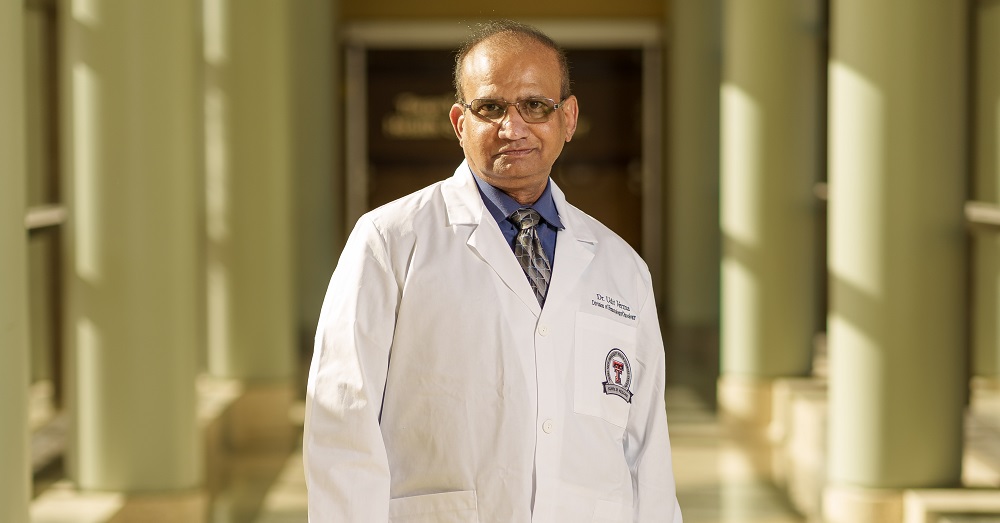What Do You Know about Esophageal Cancer?

Udit Verma, M.D.
Most people know that chewing tobacco predisposes you to the risk of mouth cancer, and smoking to that of lung and several other cancers. However, these and several other lifestyle factors such as excessive alcohol, habitual consumption of extremely hot beverages or obesity also can predispose you to another deadly form of cancer — esophageal cancer.
Esophageal cancer is more common among men than among women. Although esophageal cancer is seen less often than multiple other common cancers, occurrence is increasing. Currently, there are no established screening methods. The difficult thing about esophageal cancer is that symptoms can remain silent until the cancer is quite advanced. Usually, patients are diagnosed at a point where they need to undergo more aggressive treatments, and many times the prognosis may be poor.
And back to that hot beverage. Research shows that drinking very hot beverages does not cause esophageal cancer. There is, however, a higher incidence of esophageal cancer in people who drank more hot drinks and also drank alcohol every day or smoked. If one is exposed to multiple risk factors such as chewing tobacco and alcohol use, the risk of esophageal cancer increases.
Another risk factor includes gastroesophageal reflux disease or reflux. But it is important to add that many people have reflux but do not go on to develop esophageal cancer. However, if one does suffer from chronic heart burn requiring long-term use of over-the-counter antacid products, it is prudent to discuss this with your primary care provider or gastroenterologist to find out if symptoms are concerning enough to consider an upper GI endoscopy (EGD).
Patients experiencing chronic heart burn can suffer from a condition called Barret’s esophagus, a condition where the lower lining of the esophagus sustains damage due to inflammation produced by acid reflux.
This alters the cell lining and can be precancerous in many individuals. Recognition of this and treatment or close monitoring may be required. This may save many patients’ lives by early recognition of esophageal cancer and treatments which are much less morbid and usually can be performed with EGD using multiple methods which are available now.
Esophageal cancer symptoms may include:
- Difficulty swallowing solids or pain while swallowing. This should be never taken lightly and one should always reach out to your physician for further evaluation.
- Retrosternal pain (chest pain) either present as continuous discomfort or precipitated by eating.
- Chronic cough
- Unexplained weight loss
- Sensation of something sticking in your throat.
- Vomiting and/or sometimes vomiting of blood (called hematemesis).
Advanced esophageal cancer can cause multiple other symptoms which need to be evaluated by a physician. The treatment options will vary with each patient depending on the stage of the cancer, whether the tumor can be completely removed by surgery and the patients’ overall general health.
Esophageal cancer is usually treated with concurrent chemotherapy and radiation. Patients who already have metastatic disease or are not a candidate for surgery may be treated with various chemotherapeutic regimens, usually in combination with one of the immunotherapy drugs or a specific targeted agent.
Recent multiple breakthroughs including understanding the biology of these tumors, and development of multiple immunotherapeutic drugs, which stimulate the body’s own immune system to target cancer cells and other targeted agents, has doubled life expectancy of these patients.
Lifestyle changes such as avoiding smoking, tobacco chewing, excessive alcohol and maintaining a healthy weight can reduce incidences of esophageal cancer and multiple other cancers which carry poor prognosis as well, mainly lung cancer, pancreatic cancer and bladder cancers. There continues to be development of new drugs at a much faster pace compared to just a decade ago and improvement in surgical techniques that are quite encouraging with the hope that in the near future, esophageal cancer will become a highly curable disease.
Udit Verma, M.D., is an oncologist at Texas Tech Physicians and a professor for the Texas Tech University Health Sciences Center Department of Internal Medicine.
Related Stories
The John Wayne Cancer Foundation Surgical Oncology Fellowship Program at Texas Tech University Health Sciences Center Announced
TTUHSC is collaborating with the John Wayne Cancer Foundation and has established the Big Cure Endowment, which supports the university’s efforts to reduce cancer incidence and increase survivability of people in rural and underserved areas.
Making Mental Health a Priority in the New Year
Sarah Mallard Wakefield, M.D., a psychiatrist with Texas Tech Physicians, talks about strategies to combat widespread and growing anxiety.
TTUHSC Dean to be Inducted into the National Academies of Practice as Distinguished Fellow
Gerard E. Carrino, Ph.D., MPH, dean of the TTUHSC Julia Jones Matthews School of Population and Public Health, will be inducted into the National Academies of Practice (NAP) as a Distinguished Fellow of the Public Health Academy.
Recent Stories
The John Wayne Cancer Foundation Surgical Oncology Fellowship Program at Texas Tech University Health Sciences Center Announced
TTUHSC is collaborating with the John Wayne Cancer Foundation and has established the Big Cure Endowment, which supports the university’s efforts to reduce cancer incidence and increase survivability of people in rural and underserved areas.
TTUHSC Receives $1 Million Gift from Amarillo National Bank to Expand and Enhance Pediatric Care in the Panhandle
TTUHSC School of Medicine leaders accepted a $1 million philanthropic gift from Amarillo National Bank on Tuesday (Feb. 10), marking a transformational investment in pediatric care for the Texas Panhandle.
Texas Tech University Health Sciences Center Permian Basin Announces Pediatric Residency Program Gift
TTUHSC Permian Basin, along with the Permian Strategic Partnership and the Scharbauer Foundation, Feb. 5 announced a gift that will fund a new pediatric residency.
